For the first time, Vietnamese grapefruit has been exported to Australia - one of the most demanding agricultural markets in the world ; at the same time, Vietnam has also "opened its doors" to welcome Australian blueberries.
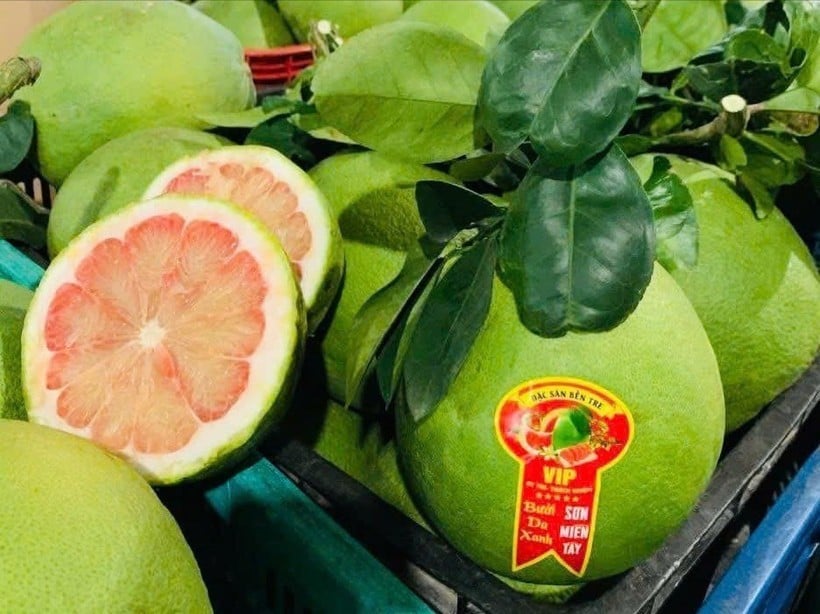
In order for Vietnamese grapefruit to be exported to Australia - one of the most demanding agricultural markets in the world, over the past two years, the two sides have coordinated, promoted technical exchanges, completed pest risk analysis reports and reached agreements on both quality and procedures.
Thus, grapefruit has become the 6th fruit of Vietnam to be exported to Australia (alongside dragon fruit, lychee, longan, mango and passion fruit). This not only expands the export route, but also demonstrates Vietnam's increasing prestige and management level in plant quarantine.
The Department of Crop Production and Plant Protection ( Ministry of Agriculture and Environment ) has just coordinated with the Australian Embassy in Vietnam to organize a ceremony to announce the export of Vietnamese grapefruit to Australia and Australian blueberries to Vietnam, opening up a two-way cooperation direction, helping to diversify products.
As required, exported grapefruit batches must meet many standards such as: Fruit must be intact, free from 19 harmful organisms banned by Australia, produced in registered and coded growing areas, packaged, labeled and irradiated at a minimum dose of 150 Gy at approved facilities.
Before issuing a quarantine certificate for each shipment, the Vietnamese quarantine agency will randomly check 600 fruits to ensure there are no signs of pests, soil or impurities. Upon arrival in Australia, the product will continue to be sampled and re-checked by the country's quarantine agency to ensure standards.
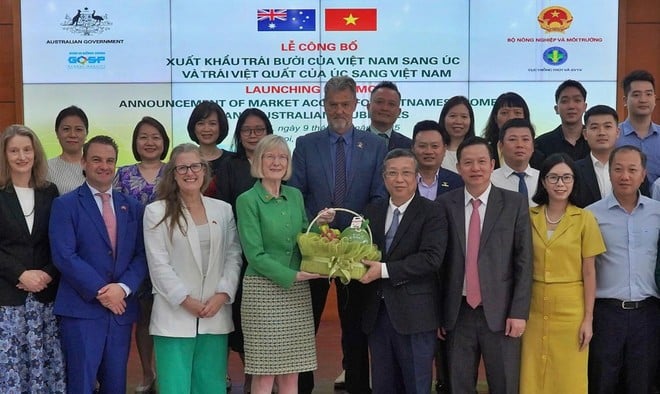
Deputy Minister of Agriculture and Environment Hoang Trung emphasized that this is a special event in the agricultural cooperation between Vietnam and Australia - not only a trade and technical event but also a vivid demonstration of trust and understanding cooperation for the benefit of farmers and consumers of the two countries.
Mr. Trung also said that Australia is becoming one of Vietnam's trusted and important partners in the global agricultural supply chain. Two-way agricultural trade turnover in 2024 will reach 2.24 billion USD, with the growth of many key products between the two countries.
However, compared to the agricultural production potential of both sides, this is still a modest figure, there is still much room for further development in the coming time. Therefore, in recent times, Vietnam and Australia have regularly exchanged technical cooperation and policy dialogue, creating more favorable conditions for opening the market for potential fruits of the two countries.
To date, grapefruit is the sixth fruit from Vietnam allowed into Australia. Meanwhile, blueberries are the seventh fruit from Australia imported into Vietnam (after grapes, oranges, tangerines, cherries, peaches, and nectarines).
In recent years, the Vietnamese grapefruit industry has made strong progress in standardizing growing areas, safe production, traceability, and applying advanced cultivation techniques according to VietGAP/GlobalGAP standards, integrated pest management (IPM), fruit bagging and off-season flowering treatment, ensuring consistent quality and almost year-round supply.
Other plant quarantine standards such as irradiation treatment and packaging facilities are also proactively met by localities and businesses.
For more information, Mr. Huynh Tan Dat, Director of the Department of Crop Production and Plant Protection, said that fresh Vietnamese grapefruit is now available in the markets of 14 countries and territories, including the United States, South Korea, New Zealand...
The area of grapefruit cultivation in the country is increasingly expanding, from 50,000 hectares in 2015 to more than 100,000 hectares in 2025 with an output of nearly 1 million tons per year. The export turnover of fresh grapefruit is about 60 million USD (in 2024).
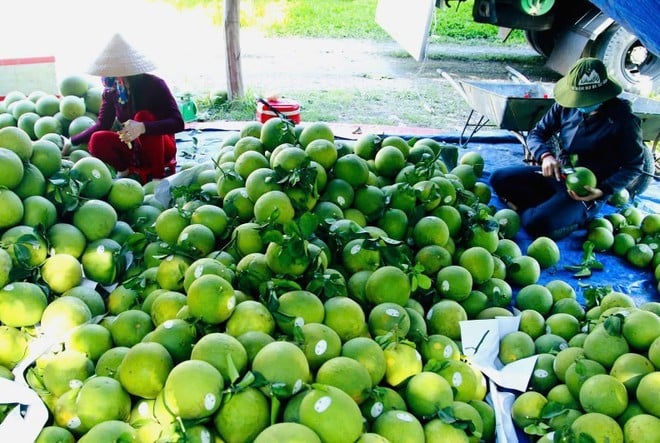
To ensure full compliance with requirements on plant quarantine and food safety for grapefruit exported to Australia, Mr. Dat said that the Department of Crop Production and Plant Protection will coordinate with specialized agencies in localities to conduct training and disseminate regulations on plant quarantine and food safety; provide guidance on establishing and granting codes for growing areas and facilities for packing grapefruit for export, etc.
Opening a new chapter in sustainable agricultural cooperation
In line with the two-way cooperation, today, Vietnam also officially welcomed fresh blueberries from Australia to Vietnamese consumers. Australian blueberries are known as one of the world's top quality fruits, rich in nutrients, grown in clean ecological conditions, strictly controlled according to biosafety standards.
To facilitate the export of Vietnamese grapefruit and Australian blueberries, Deputy Minister Hoang Trung requested units of the Ministry of Agriculture and Environment, localities, businesses and industry associations to comply with Australian regulations on fresh grapefruit.
Especially the production process, traceability, pest control; strengthen training and propaganda for people about regulations to ensure product quality when exporting, enhance the image of Vietnamese agricultural products in the international market in general and the Australian market.
Along with that, Mr. Trung requested that the Vietnamese technical quarantine agency quickly complete the necessary technical procedures, creating favorable conditions for the import of Australian blueberries into Vietnam.
“From Vietnamese grapefruit to Australian blueberries, the two countries will open a new chapter in sustainable agricultural cooperation and mutual development,” said Mr. Trung.
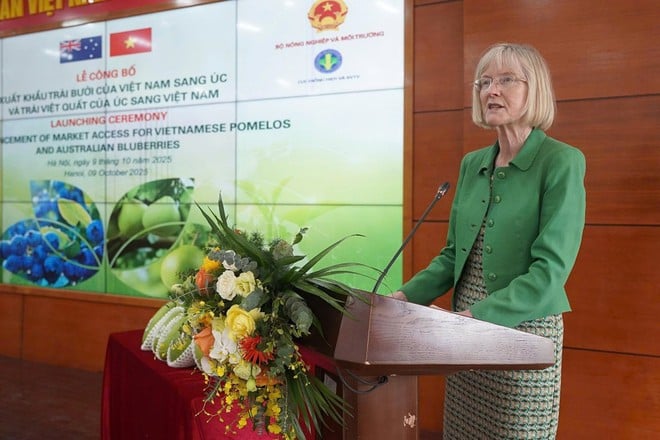
On the partner side, Australian Ambassador to Vietnam Gillian Bird said the announcement ceremony to open the market for Vietnamese grapefruit to Australia and Australian blueberries to Vietnam is an important milestone in agricultural cooperation between the two countries.
Ambassador Gillian Bird affirmed that Australia's security, prosperity and economic future are closely linked to the Southeast Asian region, including Vietnam.
According to the Australian Ambassador, agriculture is one of the important pillars of bilateral cooperation. Both countries share the goal of developing sustainable, profitable and climate-resilient agriculture. In 2024 alone, Ms. Gillian Bird said that two-way trade in agriculture and food reached 4.4 billion AUD, demonstrating the deepening economic relationship.
To date, Australia has supplied Vietnam with high-quality products such as cotton, wheat, red meat, milk and vegetables; while Australia's demand for Vietnamese agricultural products such as seafood, coffee, rice and fruit has also been constantly increasing.
With the above cooperation foundation, the Australian Ambassador to Vietnam emphasized that today's protocol signing ceremony opens up great opportunities for fruit and vegetable trade cooperation.
“I am delighted that Vietnamese consumers will soon be able to enjoy Australian blueberries – a product grown in diverse soils and climates, with delicious flavours, high nutritional value and meeting the most stringent safety and sustainability standards. Due to the short geographical distance, blueberries can be transported to the Vietnamese market within 24 hours of harvest,” said Ambassador Gillian Bird.
Besides, Ambassador Gillian Bird also expressed her wish to soon enjoy Vietnamese grapefruit in Australia.
The Ambassador highly appreciated the cooperative efforts between the Australian Ministry of Agriculture, Fisheries and Forestry and the Vietnamese Ministry of Agriculture and Environment (especially the Department of Crop Production and Plant Protection) in implementing the “2+2” cooperation mechanism, allowing each side to simultaneously open the market for two priority products./.
Source: https://baolangson.vn/lan-dau-tien-buoi-viet-nam-xuat-sang-australia-khang-dinh-uy-tin-vi-the-5061441.html


![[Photo] Opening of the World Cultural Festival in Hanoi](https://vphoto.vietnam.vn/thumb/1200x675/vietnam/resource/IMAGE/2025/10/10/1760113426728_ndo_br_lehoi-khaimac-jpg.webp)



![[Photo] Unique Phu Gia horse hat weaving craft](https://vphoto.vietnam.vn/thumb/1200x675/vietnam/resource/IMAGE/2025/10/10/1760084018320_ndo_br_01-jpg.webp)
![[Photo] Ho Chi Minh City is brilliant with flags and flowers on the eve of the 1st Party Congress, term 2025-2030](https://vphoto.vietnam.vn/thumb/1200x675/vietnam/resource/IMAGE/2025/10/10/1760102923219_ndo_br_thiet-ke-chua-co-ten-43-png.webp)





































































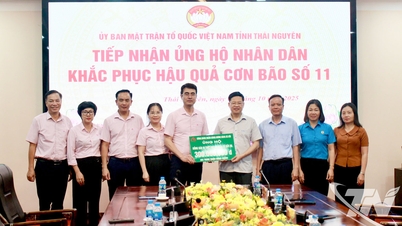

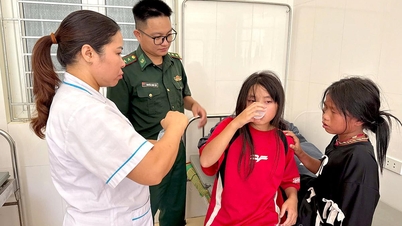

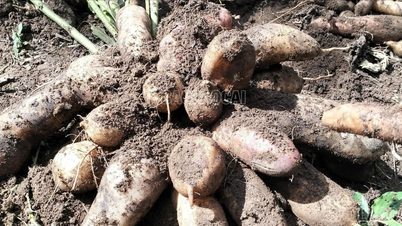

















Comment (0)